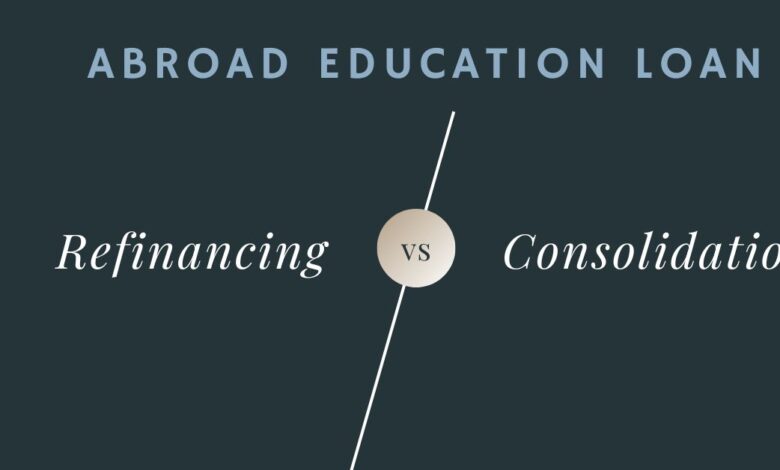
Pursuing higher education abroad is a dream of numerous students, yet it comes with a hefty price tag as a hurdle. Thus, securing an overseas education loan unlocks doors to numerous academic aspirations, but managing the repayment can be equally challenging.
If you are struggling to keep track of multiple due dates, or simply seeking more manageable repayment options, you might be considering either refinancing or consolidating your study abroad loan. While both options aim to streamline your repayment journey, they differ significantly in their purpose and impact.
Understanding their differences is essential before you make an informed decision. Thus, this article will give you a brief insight into refinancing and consolidation of education loans for abroad studies. So let us get started.
Comparing Loan Consolidation & Loan Refinancing
What is Overseas Education Loan Consolidation?
Consolidation is like combining all your existing loans into one loan. Instead of having multiple loans with different interest rates and payment schedules, you’ll have just one loan with a single interest rate. Let us check out its benefits and limitations below.
Benefits
- Simplified Repayment: It makes managing your payments easier because you only have to deal with one loan instead of multiple ones. This helps you keep track of due dates and budgeting.
- Potential Monthly Payment Reduction: Combining your loans into one might lower your monthly payment, giving you some breathing room with your finances, especially if you extend the repayment term.
- Improved Credit Score: Making timely payments on your consolidated education loan for MBA abroad or any other course can boost your credit score, making it easier for you to borrow money in the future.
Limitations
- Loss of Federal Loan Benefits: If you consolidate federal loans with private lenders, you might lose access to important government benefits.
- Possibly Higher Interest Rate: While you aim for a lower rate, the consolidated loan’s interest rate could end up being an average of your existing rates which means you might pay more interest overall.
- Extended Repayment Term: If you choose a longer repayment period to lower your monthly payment, you’ll end up paying more in interest over the life of the loan, even if your monthly payments are lower.
What is Overseas Education Loan Refinancing?
Overseas education loan refinancing is when you get a new loan from a different lender to pay off your current loan. The goal is to get a better deal, like a lower interest rate, which could save you money over time. Essentially, you’re swapping your old loan for a new one to try and reduce how much you pay in interest in the long term. Let us have a glance at the benefits and limitations below.
Benefits
- Possibly Lower Interest Rate: If your credit score has improved, you might qualify for a lower interest rate with the new loan, which could save you a lot of money in the long run.
- Fixed or Variable Rates: You can choose between fixed-rate loans for steady monthly payments or variable-rate loans, which might start lower but could go up later.
- Flexible Repayment: Refinancing lets you customize your repayment plan to better fit your financial goals and budget, giving you more flexibility than consolidation.
Limitations
- Loss of Federal Benefits: Just like with consolidation, if you refinance federal loans with private ones, you might lose access to important federal benefits.
- Credit Score Requirement: Getting a lower interest rate through refinancing usually requires a good credit score, which not everyone may have.
- Additional Charges: Some lenders might charge fees for processing your refinance application, which adds to the overall cost of the loan.
Summing Up
In simple terms, consolidation can make things easier in the short term, but you might lose out on some benefits and end up paying more in the long run. Refinancing is like trading in your old loan for a new one that might be better. Nevertheless, it’s essential to weigh the pros and cons carefully before deciding. So, if you are planning to opt for a student loan for USA, Australia, Canada, or any other country we recommend you reach out to some of the top overseas education loan advisors for complete guidance. Good luck!
